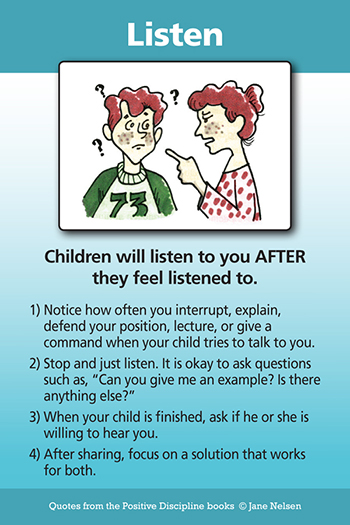From the Positive Discipline Parenting Tool Cards. Also available as an App for iPhone and Android.
Many parents complain that their children don’t listen, yet few parents really listen to their children.
Children will listen to you after they feel listened to.
- Notice how often you interrupt, explain, defend your position, lecture, or give a command when your child tries to talk to you.
- Stop and just listen. It is okay to ask questions such as “Can you give me an example? Is there anything else?”
- When your child is finished, ask if he or she is willing to hear you.
- After sharing, focus on a solution that works for both of you.
Tools for Better Listening
- Validate feelings: I can see this is very upsetting for you. Sounds like you are really sad, mad, feeling hurt.
- Ask Curiosity Questions: What happened? Want to talk about it?
- Invite Deeper Sharing: Anything else? Is there more? Anything else? Anything else?
- Listen with your Lips Closed: Hmmmm.
- Have Faith in Your Child: Know that, in most cases, your child simply needs a supportive, listening ear as part of the process of venting before coming up with his or her solution. Through this process your child learns resiliency (“I can deal with the ups and downs of life.”) and capability (“I can survive getting upset and figure out solutions.”).
More Sophisticated Listening
There are many levels of listening. When parents complain that toddlers don’t listen, that isn’t exactly true. First of all, parents really mean, “This child doesn’t obey,” or, “This child knows better.” They are right about the former (toddlers and preschoolers seldom obey) but wrong about the latter (children under the age of six do not “know better” at the level parents expect.) They may “know” the family rules at a primitive level, but not at a sophisticated level that requires the kind of morality and judgment and responsibility that does not develop until closer to the age of eight. Thus, too many children are being scolded, and even punished, for not having a level of development for which they are not yet capable.
Learning is a Developmental Process
How long does it take for a child to learn to talk, and how do they learn? This question is very easy for parents to answer. They know that their children will not learn to talk for at least a year, and that the way they learn is hearing their parents talk to them—the more the better. Then, on that happy day when their child finally says her first word, they don’t start punishing her for not speaking in sentences—at a college level. Yet these same parents punish their preschoolers for “not listening,” for “not sharing,” for “writing on walls” with crayons parents left around where their exploring, experimenting children can find them.
Listening Deeper
At an even deeper level, many parents don’t listen between the lines to the belief behind the behavior. (Perhaps a child is feeling “dethroned” by the birth of a new baby). They don’t listen to hear if their children are feeling powerless or discouraged. They don’t listen from an understanding of developmentally age-appropriateness or brain development (see above).
Example is the best teacher. Learn to be a better listener and someday, when all their developmental growing catches up, so will your children.



No Comments yet!